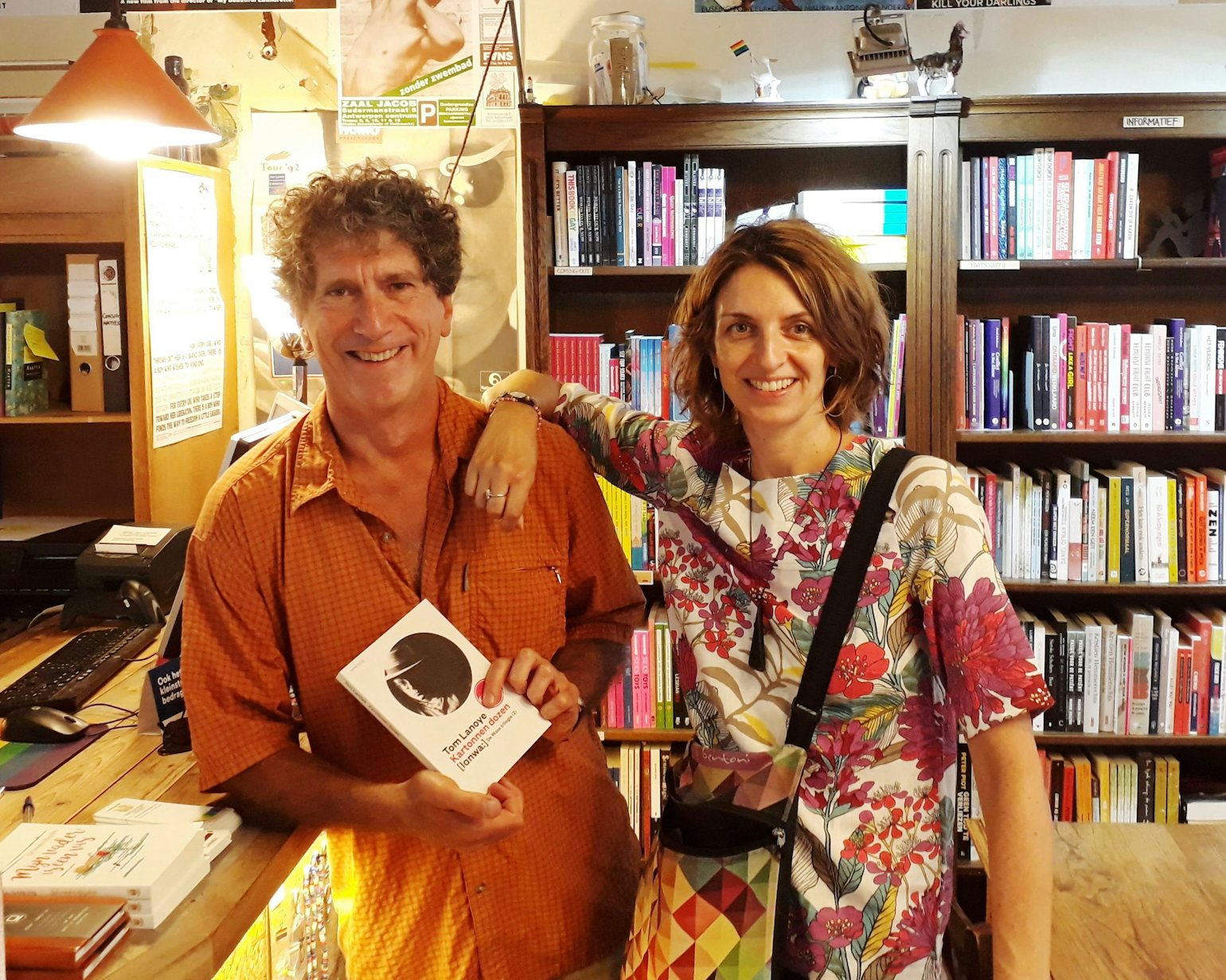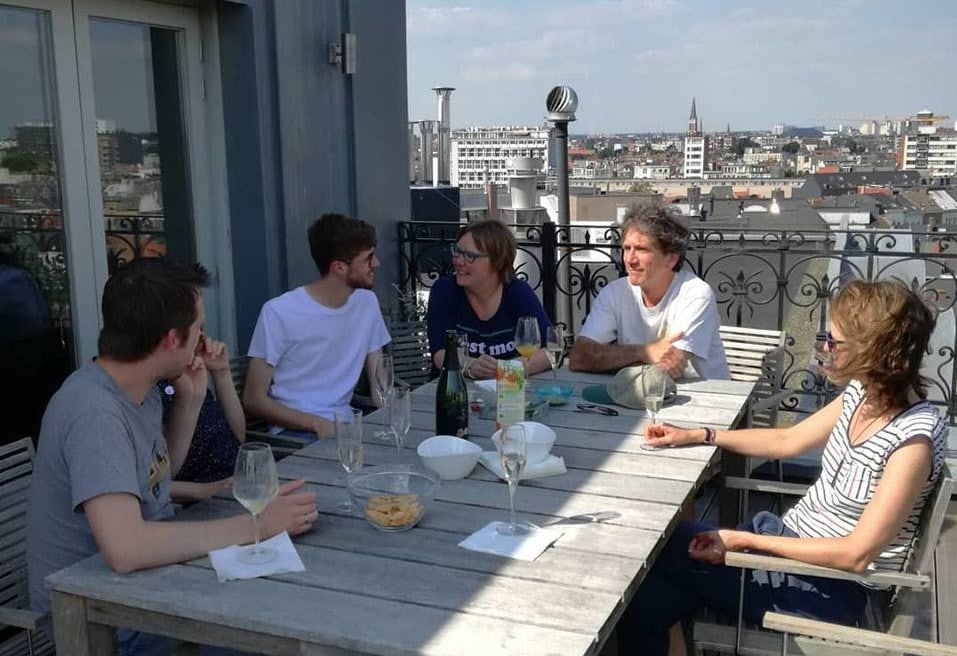Summer at the Translators' House
In June, translators Jonathan Reeder and Michele Hutchison lived and worked in the Antwerp Translators' House.
Michele's report in words, and Jonathan's in pictures.
Summer, football and language issues
Sunday morning and the bells in a church nearby are tolling on my last day in the Translators' House. Sunlight is shining through the window so even this dim back room feels summery. The last time I was here was in December 2014 to work on my translation of Fortunate Slaves by Tom Lanoye. It was cold and dark and gloomy. I vowed if I ever came back it would be in the summer. And now June 2018 has proved me right. Antwerp has come alive, the squares and terraces are bursting, the football here turns crowds into happy conga dancers rather than the drunken vandals I know from home. Belgium is doing well in the World Cup and everyone’s on a high.
Part of the joy of the past two weeks has been sharing the apartment with my fellow Dutch-English translator Jonathan Reeder. Sharing with someone with the same language combination meant that throughout the day we could discuss any obstacles that arose in each of our translations, while out of working hours, conversations turned to the differences between British and American English, some of them subtle, others quite glaring. And then what about the degree of offensiveness of certain colloquialisms, particularly those with religious or sexual connotations? How many readers will you offend if you use the word ‘fuck’ in your translation – is it differently charged for British or American readers? And how do you talk about sex without being crude or childish and why don’t Americans have a neutral word for ‘piemel’?

Meeting up
When I arrived, Jonathan had already scouted out the city and found out exactly where to go and what to see and was buzzing with plans for us. See his photo-reportage after this piece. But before that, I’ll list some of the things I’ve done. Once I’d settled in, I met up with Lien Devos from Flanders Literature to discuss forthcoming graphic novels and children’s books. I’m happy to translate almost any genre, which is a little risky in terms of positioning myself as a translator. I’m more generalist than specialist, I suppose. That said, I do try to keep up with all the genres I translate. The beautifully-illustrated graphic novel Sugar by Serge Baeken which I translated has just been published in the UK by Soaring Penguin Press so it was nice to see a shiny new copy in the Foundation’s meeting room. There’s even a picture of my own cat on the back page. A week later, I met up with Serge and his wife for a little publication dinner; fingers crossed that this gorgeous book for all cat lovers will find new readers across the pond.
Jonathan had already found out about a place called Zomerfabriek in an old factory building nearby and by chance, Isabel Hessel, a translator from Dutch into German, suggested we all meet up there. Last year I’d talked to Isabel before starting on my translation of Come Here and Let Me Kiss You by Griet Op de Beeck since she had just finished translating the book herself. It was great to touch base again now I’m in the finishing stages. It’s always useful to talk to translators who have done the same books into other languages. We talked about strategies for dealing with certain characteristics of the prose style and agreed about many things.
All writing is communication. It should be out there, it might help other people in some way.Griet Op de Beeck
One of the main goals of my trip was to meet up with Griet Op de Beeck in person. I had mailed her in trepidation, knowing she is incredibly busy and might not have time in her schedule. Fortunately she wrote back right away. One of the first things she said when I met her in a cool bike café in her hometown of Ghent was how pleased she was to get the opportunity to talk to me. She was more than happy to be involved in the translation process, particularly of her English translation since she felt competent in this language. She talked about the novel, explaining at length what a dramaturg does and how the theatre world works; we discussed translation and our respective careers. She wondered about my own creative outlets beyond translation, and when I told her I wrote poetry, she made me promise to do something with it. ‘All writing is communication,’ she said, ‘it should be out there, it might help other people in some way.’ When I returned to work on her novel, I pondered the ways her work has helped readers by being so psychologically credible. People feel a connection, they feel understood.
Roof terrace
In the second week, I met up with another translator with a different language combination, Katrien Vandenberghe, who translates from French into Dutch. She lives in Ghent and has been an invaluable support at times when I’ve wondered about Flemish expressions or the differences between Flemish and Dutch. We are friends too, so as well exchanging publishing gossip, it was nice to catch up. Colleague and friend David Colmer happened to be in town meeting Jeroen Olyslaegers for his translation of 'WILL' so the three of us hung out on the roof terrace with Jonathan’s guest for the evening, the lovely Carmien Michels, whose poetry I have just started reading.

At a second trip to the Generaal van Merlenstraat, I managed to catch up with Elise Vanoosthuyse, Michiel Scharpé and Patrick Peeters. Later in the week we took over the roof terrace again for drinks with our sponsors. I met Yannick Geens who will be covering theatre (hooray!), Noemi De Clercq, and caught up with Els Aerts whom I have known the longest of the lot. Jonathan also wanted to introduce me to writer and journalist, Gaea Schoeters, whose play 'Channel' he has translated with Jane Hedley-Prole. It was nice to hear what Gaea had to say about Belgian theatre productions too, and just to make contact.
Focus (and mum)
As I pack my bags to leave, I can look back on an incredibly productive fortnight, away from all the responsibilities of home. As a single mother of children aged 11 and nearly 14, my work usually has to be juggled with home and school management. Now I could focus on just one thing (my book translation), work, rest and regain the energy to face a new onslaught. And, for a second time, offer my thanks not only to Flanders Literature for this opportunity but also to my mother for holding down the fort at home so that I could escape.